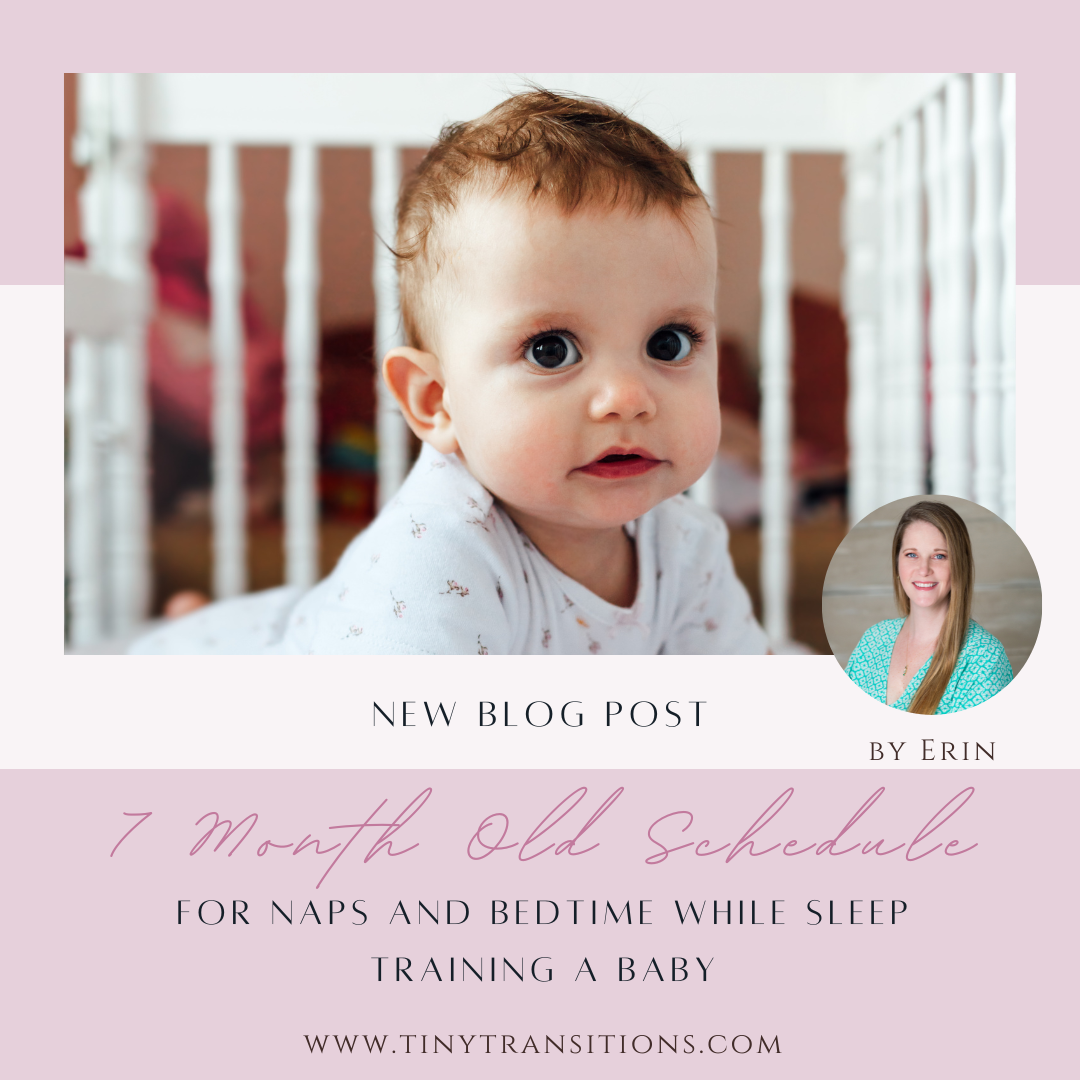Parenting a 7-month-old comes with its unique joys and challenges, especially when it comes to sleep. As your baby reaches this critical milestone, understanding their wake windows, navigating sleep regressions, and creating the perfect nap schedule becomes crucial for both your child’s well-being and your sanity.
In this comprehensive post, I will delve deep into these essential aspects of infant sleep, providing you with practical insights and expert tips to ensure restful nights for the whole family.
Hi, Erin Forish here, a Certified Baby & Toddler Sleep Coach and Certified Lactation Counselor, and this week, I am taking over the blog to answer the #1 question I see from new moms with regards to their 7 month old and common sleep struggles, so let’s dive in.
Understanding 7-Month-Old Wake Windows
What Are Wake Windows?
Wake windows are specific time intervals during which your 7-month-old baby is awake and alert before needing to nap again. These windows play a vital role in preventing overtiredness and ensuring your baby gets the right amount of sleep.
Finding the Perfect Wake Window
Identifying your baby’s ideal wake window involves keen observation of their natural sleep cues. At 7 months, your baby typically requires about 3 hours of awake time between naps, with balanced stretches in the morning and in the afternoon. Look for signs of drowsiness like eye rubbing, yawning, or fussiness to determine the right time for a nap.
Navigating Sleep Regressions
What Is a Sleep Regression?
A sleep regression is a temporary disruption in your baby’s established sleep patterns. Around the age of 7 months, some babies experience sleep regressions due to developmental milestones, teething, or changes in routine.
Coping with Sleep Regressions
Dealing with a sleep regression can be challenging, but there are strategies to help both you and your baby get through this phase:
- Maintain Consistency: Stick to a consistent bedtime routine to provide comfort and predictability for your baby.
- Offer Comfort: When your baby wakes during the night, respond with soothing techniques rather than immediately offering a feed.
- Consider Sleep Training: If sleep regressions persist and disrupt your family’s sleep, consider gentle sleep training methods tailored to your baby’s needs.
Crafting the Ideal 7-Month-Old Nap Schedule
Importance of a Well-Structured Nap Schedule
A well-structured nap schedule is key to ensuring your baby gets the right amount of sleep and maintains a happy disposition throughout the day. For a 7-month-old, a nap schedule with 3 hours of awake time between naps can be particularly effective.
Sample Nap Schedule
Here’s a sample nap schedule to consider:
- Wake for they day around 7:00 am
- Morning Nap: Start with a nap 3 hours after waking up, ideally at 10 am.
- Afternoon Nap: Schedule a nap 3 hours after waking from the morning nap.
- Be sure to wake baby by 4 pm to protect bedtime.
- Give your baby 3 hours of awake time for activities and dinner.
- Bedtime Routine: Establish a consistent bedtime routine to prepare your baby for a restful night, down for bedtime in the crib with lights off at 7:00 pm.
Snag our sample schedules for every age and wake window here. Remember, this is just a guideline, and individual variations may occur. Adjust the schedule to meet your baby’s unique needs.
Effective Sleep Training for 7-Month-Olds
The Importance of Sleep Training
Sleep training is a valuable tool to establish healthy sleep habits in your 7-month-old. It promotes better sleep for your baby and allows you to get the rest you need as well. When child sleep better, they eat better and are rested and refreshed to thrive.
Gentle Sleep Training Methods
Several gentle sleep training methods can be effective for 7-month-olds, such as:
- Ferber Method: Gradual checks and comforting intervals.
- No Tears Method: A soothing approach that minimizes crying.
- Chair Method: Gradual withdrawal of parental presence during sleep.
There is no need to use cry-it-out sleep training. Remember, every baby is unique, so be patient and flexible when choosing a method that works best for your child & book a complimentary call with me if you need added guidance. Consistency and responsiveness to your baby’s needs are key to successful sleep training.
Understanding 7-month-old wake windows, addressing sleep regressions, crafting an ideal nap schedule with 3 hours of awake time between naps, and implementing effective sleep training methods can significantly improve your baby’s sleep quality and overall well-being. This knowledge equips you to create peaceful nights and well-rested families. Together, I can support and empower you on your journey to provide your little ones with the gift of sleep and help you feel confident in parenting.
About the Author
Hello, I am Erin Forish, one of Philadelphia’s top baby sleep coaches, a Certified Lactation Counselor (CLC), and a Child Passenger Safety Technician (CPST). With a passion for improving sleep quality and a wealth of expertise,
As a highly regarded Child & Adult Sleep Coach with a deep understanding of the challenges that come with sleepless nights, particularly when it involves babies and young children, my journey into the world of sleep coaching began with a personal experience of sleep struggles as a new parent. Book a Complimentary Call Now


